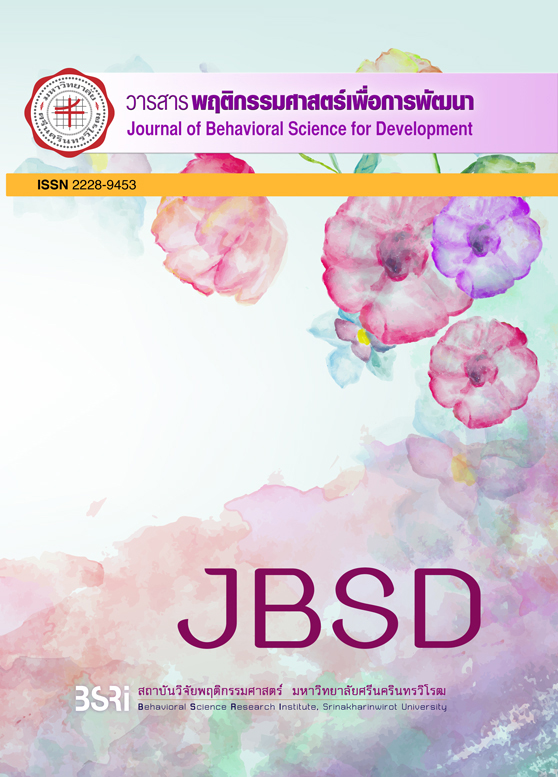The Development of Assessment of Conceptual Knowledge in Physics by Using a Concept Map : Application of Generalizability Theory
Abstract
การพัฒนาแบบประเมินความคิดรวบยอด วิชาฟิสิกส์โดยใช้แผนผังมโนทัศน์ : การประยุกต์ใช้ทฤษฎีการสรุปอ้างอิงความน่าเชื่อถือของผลการวัด
Abstract
The purposes of this research were to1) develop and examine conceptual knowledge assessment by using concept mapping to teach Work and Energy of Matthayomsuksa 4 students in secondary school 2) compare the generalizability coefficient of conceptual knowledge assessment by using the construct-a-map with created linking phrases and construct-a-map with selected linking phrases in condition with a different order of construction ; and on different occasions by generalizability theory. The samples of this study were 68 Matthayomsuksa 4 students of academic year 2012 in 1 extra-large secondary school in the Secondary Educational Service Area Office 16. The findings were summarized as follows : 1) The reliability of conceptual knowledge assessment by using construct- a- map with created linking phrases and the construct-a-map with selected linking phrases were 0.67–0.70 and 0.66 -0.84 respectively. 2) For assessment of the conceptual knowledge by using the construct-a-map with created linking phrases followed by using construct- a- map with selected linking phrases. There was a value for the generalizability coefficient higher than the conceptual knowledge assessment by using construct- a- map with selected linking phrases followed by using the construct-a- map with created linking phrases. The coefficient was significantly different at level 0.05.When the conceptual knowledge assessment was evaluated by using the construct-a-map with only created linking phrases. There was a value for the generalizability coefficient at a significantly different level of 0.05 when tested on two different occasions.
Keywords: Physics , Concept map , Generalizability Theory , Occasions
บทคัดย่อ
การศึกษาครั้งนี้มีจุดมุ่งหมายเพื่อพัฒนาและตรวจสอบคุณภาพของแบบประเมินความคิดรวบยอด โดยใช้แผนผังมโนทัศน์ วิชาฟิสิกส์ เรื่องงานและพลังงานของนักเรียนชั้นมัธยมศึกษาปีที่ 4 และเปรียบเทียบค่าสัมประสิทธิ์การสรุปอ้างอิงของแบบประเมินความคิดรวบยอดโดยใช้แผนผังมโนทัศน์แบบการสร้างผังคำและคำเชื่อม และแบบการเลือกคำเชื่อมที่มีลำดับของการสร้างแผนผังมโนทัศน์ และจำนวนครั้งในการวัดที่ต่างกัน กลุ่มตัวอย่างเป็นนักเรียนชั้นมัธยมศึกษาปีที่ 4 จำนวน 68 คน แผนการเรียนวิทยาศาสตร์ ปีการศึกษา 2555 โรงเรียนมัธยมศึกษาขนาดใหญ่พิเศษ สังกัดสำนักงานเขตพื้นที่การศึกษามัธยมศึกษาเขต 16 จำนวน 1 โรง ผลการศึกษา พบว่าแบบประเมินความคิดรวบยอดวิชาฟิสิกส์โดยใช้แผนผังมโนทัศน์แบบการเลือกคำเชื่อม จำนวน 4 ฉบับ ค่าความเชื่อมั่นมีค่าตั้งแต่ 0.65 - 0.70 และแบบประเมินความคิดรวบยอดวิชาฟิสิกส์โดยใช้แผนผังมโนทัศน์แบบการสร้างผังคำและคำเชื่อม จำนวน 4 ฉบับ ค่าความเชื่อมั่นมีค่าตั้งแต่ 0.66 ถึง 0.84 ค่าสัมประสิทธิ์การสรุปอ้างอิงของลำดับของการสร้างแผนผังมโนทัศน์ที่เริ่มจากแบบสร้างผังคำและคำเชื่อม ตามด้วยแบบการเลือกคำเชื่อมมีค่าสูงกว่าลำดับของการสร้างแผนผังมโนทัศน์ที่เริ่มจากแบบการเลือกคำเชื่อม ตามด้วยแบบการสร้างผังคำและคำเชื่อมอย่างมีนัยสำคัญทางสถิติที่ระดับ 0.05 และค่าสัมประสิทธิ์การสรุปอ้างอิงของแบบประเมินความคิดรวบยอดโดยใช้แผนผังมโนทัศน์แบบการสร้างผังคำและคำเชื่อม มีค่าแตกต่างอย่างมีนัยสำคัญสถิติที่ระดับ 0.05 ในการวัด 1 ครั้ง และ 2 ครั้ง
คำสำคัญ: ฟิสิกส์ การสร้างแผนผังมโนทัศน์ ทฤษฏีการสรุปอ้างอิงความน่าเชื่อถือของผลการวัด จำนวนครั้งในการวัด



